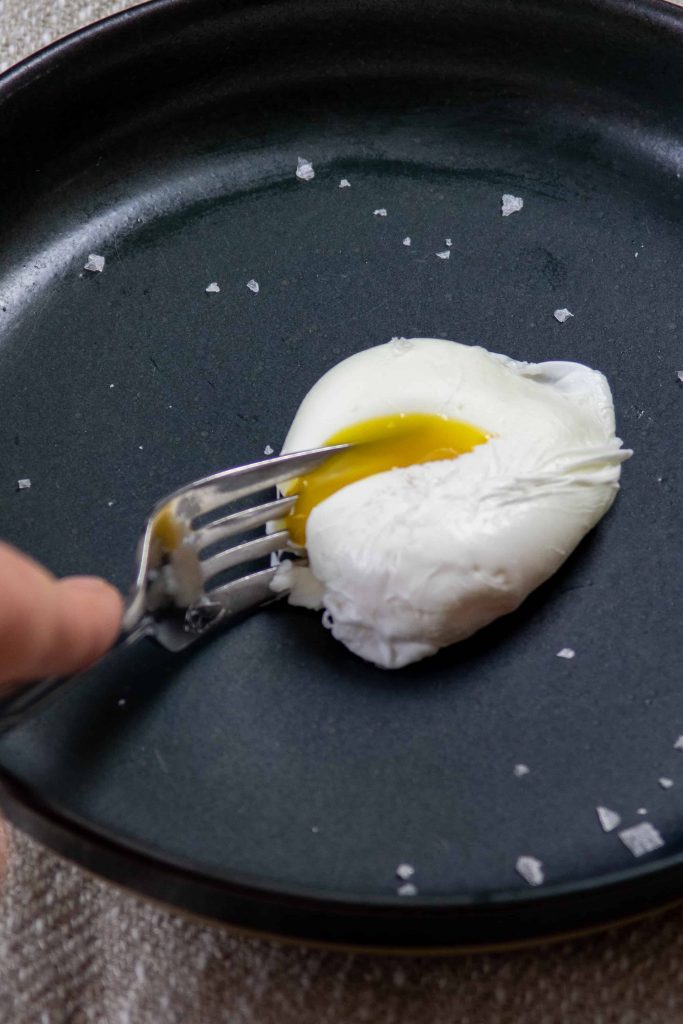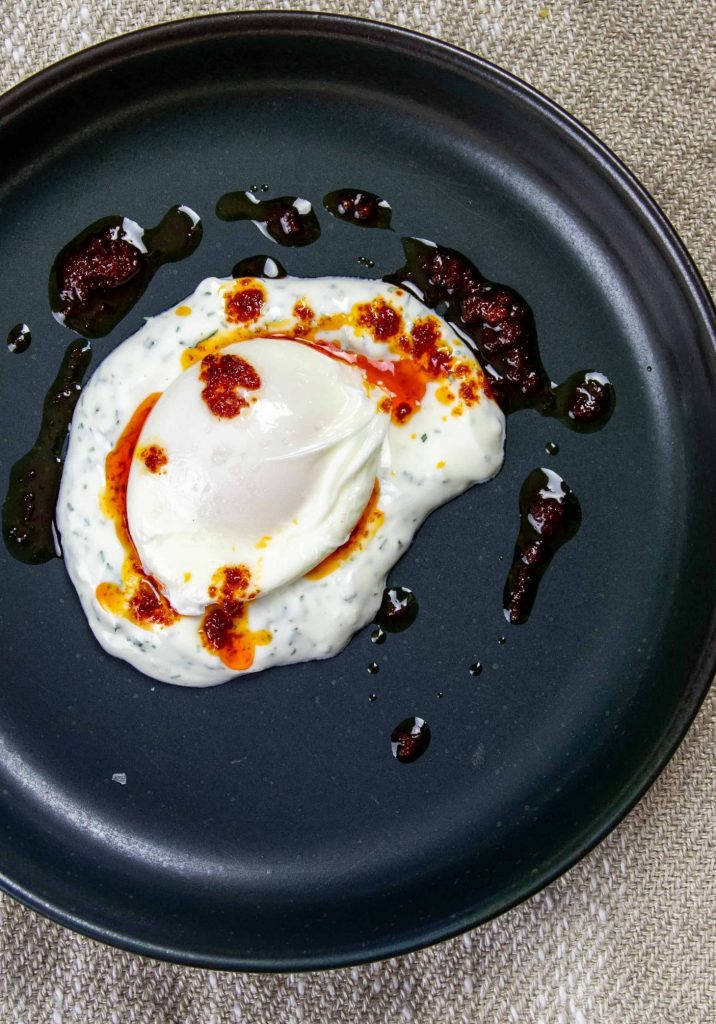There are many ways to poach an egg.
If you’re reading this, I’m guessing what you care about most (in life) is a soft runny yolk, and an egg that holds its shape. Ie: the eggs that you get at your favourite brunch spot, smothered in hollandaise sauce.
There are a few paths you can wander down on your way to poached egg town, but each fork in the road leads you to a slightly different outcome.
I’m here to help you achieve perfectly poached eggs every time. I want to make sure you don’t make a dramatic U-turn and end up with a poached egg catastrophe.

What are poached eggs?
Poaching basically means gently cooking in simmering liquid. Poached eggs generally means eggs poached in water, although you can also poach eggs in a flavourful broth or sauce. For the purposes of this article we’re covering straight up eggs poached in water.
How long do poached eggs take to cook?
I’m a runny yolk gal, so I tend to set my egg timer for 3 minutes once the eggs hit the water. However, eggs are about the most eater-specific food I can think of. So, if you like them firmer, leave them in for longer. That’s all there is to it!
A few variables to consider when poaching eggs.
Egg freshness
The fresher the egg, the better the poach. Fresh eggs have nice gelatinous whites, making them hold together much better in the hot water. Keeping your eggs cold until right before they get the dunk is also very helpful for the same reason. If you want perfectly poached eggs, make sure they’re fresh and cold.
Water temperature
Some argue that eggs poached at a higher temperature yield a tougher white. While that might be true, I don’t think it’s something you’d ever notice unless you tasted them side by side. I mean, who are you trying to impress?
The water temperature should be lively enough to coerce that egg into a beautiful little package. If the heat is too low, the egg will sink to the bottom and become kinda flat. If the water is boiling too much, the egg will be blasted apart by the aggressively boiling water. That’s no good either.
The sweet spot for egg poaching is right below the boil. You want movement in the water, but not an aggressive boil. Just enough action to keep that egg on its toes. Gently simmering if you will.
Additives
Salt – There is no need to put salt in the water. Save the salt for the end, and make sure its of the crunchy variety.
Vinegar – In cooking school and in my early cooking jobs, adding vinegar to the poaching water was a non-negotiable. Vinegar helps coagulate the protein in the egg white, playing a crucial role in keeping the egg in one piece. If you don’t use vinegar, the watery parts of the white will get all wispy like tiny floating shards.
There is a trend happening in egg poaching at the moment. Many cooks and chefs are shunning the use of vinegar.
Why? They say it makes the whites tough, and it makes the egg taste like vinegar.
How do I feel about this? Well, the answer to that question lies in the 4th factor to consider when poaching eggs… PREP.

Perfectly Poached Egg prep
Many poached egg aficionados decline the use of vinegar, and instead, they place the raw eggs one at a time into a small strainer, and allow the watery part of the egg white to pass through the strainer. They discard this part of the egg, and put only the firm white and yolk into the pot.
While It’s true that the watery part of the egg white produces the wispy whites in the water, this method is a bit too much work for me. There’s nothing really wrong with the watery white–it just indicates that the egg is a little less than farm fresh. No biggie.
In a perfect world, we would always use the freshest eggs, but let’s be real folks. Most of the eggs we are buying are at least a week or two old by the time we get poaching.
All that being said, using the strainer method will produce the best poach. So, if you want the most perfect eggs, and you have a personal assistant to wash all your dishes, strain your heart out.
A few bonus tips:
How to lower the eggs into the water
If you’re new to egg poaching, you might want to crack your egg into a small bowl before lowering it gently into the water.
Once you start poaching on a regular basis, you’ll start to be comfortable enough to just crack them straight in. If you’re using the strainer method, the best option is to lower them in right from the strainer. No matter what method you use, you’ll want to get the egg as close as you can to the water. If you drop the eggs from a height you will risk breaking your precious yolk.
And as far as removing them from the water goes, a slotted spoon is your best utensil for the job. Gently lift them out and transfer eggs onto a bit of paper towel to soak up any water.

Perfectly Poached Eggs for a crowd
If you’re doing an eggs benny banquet, you can pre-poach your eggs. Simply cook eggs until they are perfectly done or slightly underdone. At this stage you can keep them in an ice water bath for up to a few days. Then, when you’re ready, lift them out of the ice bath and warm them up in simmering water for 45 seconds or so.
This is kind of annoying and I try to avoid it whenever possible. That’s what breakfast casseroles are for, people!
Enjoy!
Now to the eating part! I can’t think of anything that a poached egg doesn’t improve. Throw one onto your breakfast hash, a hearty salad, you can even drop one right into a bowl of soup.
Right now I’m pretty into Turkish eggs: Garlicky herby strained yogurt, chili spiced, foamy butter, and perfectly poached eggs. Sprinkle with some salt and pepper, grab a chunk of bread and get into it.
Check out the video below to see how I make them.


Pingback: Why Baked Omelettes Need To Be In Your Rotation | How To Make Dinner